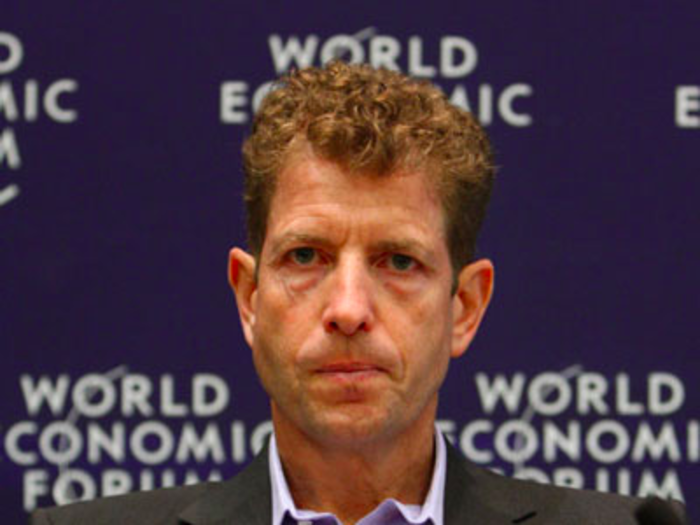
Net gains in 2016: $1.1 billion
Net gains since inception: $23.1 billion (1994)
Fund's assets under management: $33.5 billion
Highlights: Och-Ziff Capital Management agreed to settle charges of bribery, paying nearly $200 million to the Securities and Exchange Commission, in September. The hedge fund's CEO, Dan Och, agreed to pay nearly $2.2 million to settle the charges with the SEC, as did the firm's CFO, Joel Frank. The firm was accused of bribery in its financial dealings in Africa, which the SEC says included run-ins with Muammar Gaddafi's relatives.
The fund also found itself the recipient of some savvy investing advice from a 24-year old Chipotle cook.

Net gains in 2016: $0.7 billion
Net gains since inception: $23.5 billion (1993)
Fund's assets under management: $15.8 billion
Highlights: Tepper came out in support of Hillary Clinton ahead of the US election, calling Donald Trump, who went on to win the election, "the father of lies." He has said however that the US would benefit from some infrastructure spending, a key leg of Trump's campaign platform.

Net gains in 2016: $1 billion
Net gains since inception: $25.2 billion (1990)
Fund's assets under management: $24.1 billion
Highlights: Citadel has been hiring, recently adding portfolio manager Jennifer Pollak, who moved from Folger Hill Asset Management. Citadel's Aptigon unit last year poached about 17 portfolio managers from Visium Asset Management amid an insider-trading scandal.

Net gains in 2016: $2.7 billion
Net gains since inception: $25.3 billion (1983)
Fund's assets under management: $31 billion
Highlights: Baupost made a big bet on Citigroup late last year, and has potentially been rewarded with a healthy increase in the bank's stock price.
In a letter to his fund's investors last year, Klarman set out what it takes to be a successful investor.
"Endless patience, great discipline, and steely resolve are required," he said. "Nothing you do will guarantee success, though you can tilt the odds significantly in your favor by having the right philosophy, mindset, process, team, clients, and culture."

Net gains in 2016: $1.2 billion
Net gains since inception: $25.3 billion (1988)
Fund's assets under management: $27 billion
Highlights: D.E Shaw describes itself as a "global investment and technology development firm," and is the top ranked computer-driven hedge fund in the LCH Investments ranking.

Net gains in 2016: Loss of $1 billion
Net gains since inception: $41.8 billion (1973)
Fund's assets under management: $28 billion
Highlights: Soros reportedly lost a lot of money in the aftermath of the surprise election of Donald Trump, who he has since called "an imposter and con man and a would-be dictator."
"The US will be preoccupied with internal struggles in the near future, and targeted minorities will suffer," he said in a recent op-ed. "The US will be unable to protect and promote democracy in the rest of the world. On the contrary, Trump will have greater affinity with dictators."
On February 1, it was confirmed that Dawn Fitzpatrick, a senior exec at the asset-management arm of UBS, is taking over the position of chief investment officer for Soros Fund Management.

Net gains in 2016: $4.9 billion
Net gains since inception: $49.4 billion (1975)
Fund's assets under management: $117.8 billion
Highlights: Ray Dalio, the head of the hedge fund Bridgewater Associates, is cooling off on his opinion of President Donald Trump.
"While there is a lot of potential to improve fiscal policies and make beneficial structural reforms (to enhance the business friendly environment, reduce regulatory inefficiencies, etc.), there is also significant risk that his populist policies could hurt the world economy (and worse)," Dalio said in a letter to investors.
In Davos, Dalio said: "I want to be loud and clear — populism scares me."
 Luxury “floating” beach unveiled in France, termed an “ecological aberration”
Luxury “floating” beach unveiled in France, termed an “ecological aberration”
 Scientists think they’ve spotted 60 potential alien power plants in the Milky Way!
Scientists think they’ve spotted 60 potential alien power plants in the Milky Way!
 Bread, butter, milk-based health drinks, cooking oils classified as ultra-processed food, ICMR advises restriction
Bread, butter, milk-based health drinks, cooking oils classified as ultra-processed food, ICMR advises restriction

Copyright © 2024. Times Internet Limited. All rights reserved.For reprint rights. Times Syndication Service.